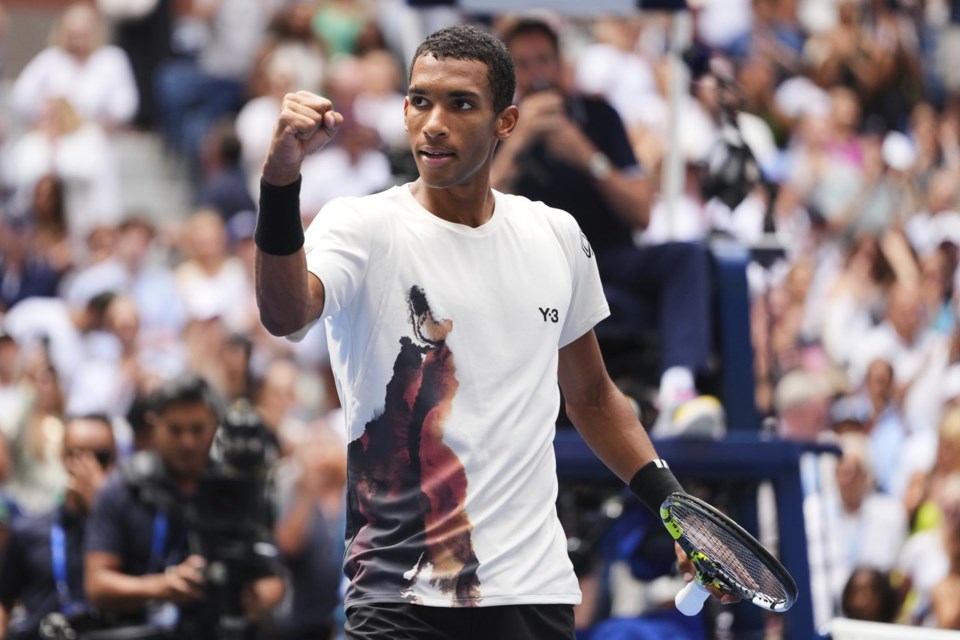NEW YORK — As Félix Auger-Aliassime moves on to the U.S. Open quarterfinals for the first time since 2021, don’t call him “Felix 2.0”.
He’s not reinvented as much as he is refreshed, healthy again, and with the passing of the years, more experienced and mature.
“It feels even better than the first time,” a beaming Auger-Aliassime said after a surprisingly undramatic 7-5, 6-3, 6-4 win over No. 15 seed Andrey Rublev of Russia on Monday afternoon.
“At 21, I was kind of on my way up. Then, to have a few setbacks, injuries, struggles with confidence and to come back for a second time, it feels more deserved. And I’m soaking up every moment,” he added.
As with No. 3 seed Alexander Zverev of Germany, who he defeated in four sets Saturday night, Auger-Aliassime came into Monday's match with a lopsided head-to-head record that was entirely not in his favour. Against Zverev, it was 2-6; against Rublev, it was 1-7, although most of those clashes had been close.
In women's doubles action, Ottawa's Gabriela Dabrowski and New Zealand's Erin Routliffe defeated No. 13 seed Cristina Bucas of Spain and Nicole Melichar-Martinez of the United States 6-4, 6-2 to advance to the quarterfinals.
Dabrowski and Routliffe, the third seed, will next face the 11th-seeded pairing of Hungary's Timea Babos and Brazil's Luisa Stefani.
Leylah Fernandez of Laval, Que., and tennis legend Venus Williams also advanced to the quarterfinals in women's doubles play with a 6-3, 6-4 win over No. 12 seed Zhang Shuai of China and Ekaterina Alexandrova of Russia.
Fernandez and Williams await the winner between top-seeded Taylor Townsend of the United States and Czechia's Katerina Siniakova and Colombia's Camila Osorio and China's Yuan Yue.
Auger-Aliassime’s runs into the second weeks of Grand Slam tournaments were almost a given in the early years of his career. He made the quarterfinals or better in three straight majors, from Wimbledon in 2021 — when he was still just 20 — through to the Australian Open in 2022.
That was the last time he made the final eight, until this week. He’ll play No. 8 seed Alex de Minaur in the quarterfinals on Wednesday.
Against de Minaur, he has a 2-1 record with the two victories, both on hard courts, dating back to 2022. If he can win that, he could head to a rematch with world No. 1 and defending champion Jannik Sinner.
Auger-Aliassime managed to win just two games when the two met in the quarterfinals in Cincinnati just a few weeks ago. It was a bitter defeat, even more because it came right on the heels of a disappointing opening-round loss to world No. 56 Fabian Maroszan at the National Bank Open in Toronto.
The pressure to do well at a home tournament is a constant, no matter where one hails from.
But part of the gradual evolution of Auger-Aliassime in recent months — work, he says, that has been constant behind the scenes but had yet to pay off in a big result — is a change in mindset about handling losses.
It’s not as though there are any secrets in tennis. The advice is generally the same, no matter who you’re hearing it from. But perhaps, at 25 with so much more experience behind him, Auger-Aliassime is a little more willing to hear it.
“Certainly there were times when I wasn’t listening as much," he said. "But I’m also listening to myself more, too, trusting myself. I think there were times when maybe I questioned myself a little too much after certain defeats. I was always so conscious of mistakes I made, being too much of a perfectionist.
“Like now, I lost in Toronto, in Cincinnati, but I made less of a big deal about it than I might have in the past. So I think that has also helped me rebound more quickly and perform better in the next tournament.”
There’s an entire generation of players who were almost the players-in-waiting, ready to step in and win major titles once the iconic triumvirate of Roger Federer, Rafael Nadal and Novak Djokovic finally retired. Only Djokovic, 38, remains of the three.
But what seemed like a natural succession has been unmercifully sabotaged by the two newcomers: Sinner and Carlos Alcaraz.
But Auger-Aliassime seems to be headed in the right direction again.
“I’m much more aware and far more strategic now about what I want to improve,” Auger-Aliassime said. “When you’re 20 or 21, you do things more on instinct, I did what I could do, and sort of went with a feeling. These last years, I’ve worked in a way to get back to a level where I know I can maintain it, try to be more consistent, and try to better master what I’m doing.”
Auger-Aliassime isn’t getting ahead of himself. He hopes this isn’t just a hot streak, a fluke, because he knows how much work went on behind the scenes.
“I hope to still go further here, and also reproduce this level in the future.” he said. “I think I’m much generally more clear-headed about my choices off the court, in my preparation, with my team, and with my life in general.
“I think it’s normal for that to come at a certain age. It’s what all of us try to do — be a little more mature, a little better, with every passing year.”
This report by The Canadian Press was first published Sept. 1, 2025.
Stephanie Myles, The Canadian Press



